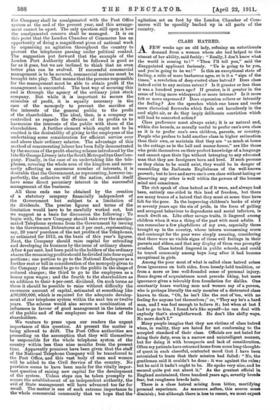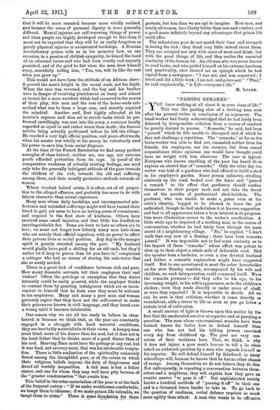CLASS HATRED. A. FEW weeks ago an old lady, refusing
an extortionate demand from a woman whom she had helped to the utmost of her ability, said feebly : " Really, I don't know what the world is coming to ! " " Then I'll tell you," said the disappointed applicant furiously. "Us is going to be you,
felt or more expressed ? Does expression relieve or intensify the feeling P Are the speeches which one hears and reads mere rhetorical fireworks which fizzle out harmlessly in the cool night air, or do they imply deliberate conviction which will lead to concerted action P Class preference must always exist; it is as natural and,
within due bounds, as morally useful to prefer one's own class as it is to prefer one's own children, parents, or country. People who profess to hold another class in higher estimation than their own, or maintain that they are " as much at home in the cottage as in the hall and manor-house," are like those who pride themselves on their perfect knowledge of a language and cannot open their lips without betraying to any educated man that they are foreigners born and bred. If such persons as they claim to be could exist, they would be in danger of resembling the Italianate Englishman of the well-known proverb; but to love and serve one's own class without hating or disserving any other is well within the powers of the human mind and conscience.
The rich speak of class hatred as if it were, and always had
been, entirely one-sided in this land of freedom, but there are many traces of a hatred that they must at some time have felt for the poor. In the improving children's books of sixty or seventy years ago the sin of pride, in the form of galling and arrogant behaviour to dependents and social inferiors, is much dwelt on. Like other savage traits, it lingered among children when it was a thing of the past with most adults. I can remember a few playfellows of my own, especially those brought up in the country, whose inborn unreasoning scorn and contempt for the poor were simply amazing, considering that there were no visible signs of these evil feelings in their parents and elders, and that any display of them was promptly crushed. Class hatred lingered in public schools, and could be traced commonly among boys long after it had become exceptional in girls.
Among the poor most of what is called class hatred arises
from ignorance on both sides, from loosely-held tradition, or from a more or less well-founded sense of personal injury. Some degree of acquaintance must precede liking, but mere ignorance gives a tolerably firm foundation for dislike. One constantly hears working men and women say of a person, who is perhaps literally the only member of a distrusted class known to them, "Oh, he isn't like the rest of 'em, with no feeling for anyone but themselves ;" or, " They say he's a hard man, and I was fool enough to believe it ; but when at last I had to go to him, I found he's like myself—he can deal with anybody that's straightforward. He don't like shifty ways. No more don't I."
Many people imagine that they are victims of class hatred
when, in reality, they are hated for not conforming to the accepted standard of their class. Officials are not hated for doing their duty, even in a narrow and unintelligent manner, but for doing it with brusqnerie and lack of consideration. Often my patients have returned home from some long-thought• of quest in such cheerful, contented mood that I have been astonished to learn that their mission had failed: " No, the gentleman said it couldn't be done : it was against the rules; but he said it hadn't ought to be. He spoke very nice, and he seemed quite put out about it." As the greatest official in England maintained, three hundred years ago, severity breeds fear, but roughness breeds hate.
There is a class hatred arising from bitter, mortifying personal experience. As manners soften, this source must diminish ; but although there is less to resent, we must expect
that it will be more resented because more vividly realised, and because the sense of personal dignity is more generally diffused. Mental injuries are self-renewing things of power, and when people are highly developed enough to feel them it must not be expected that they will be as easily forgotten as purely physical injuries or accustomed hardships. A Russian revolutionary prince tells us in his memoirs how, on one occasion, in a passion of childish sympathy, he kissed the hand of an educated house-serf who had been cruelly and unjustly punished, and of the grief he felt when the man drew himself away, scornfully telling him, "You, too, will be like the rest when you grow up."
This would not have been the attitude of an African slave : it proved the man's height in the moral scale, not his depth.
When the case was reversed, and the boy and his brother were in danger of receiving punishment as hasty and almost as brutal for a mere accident which had occurred inthe course of their play, this man and the rest of the house-serfs sub- scribed what was to them a large sum, and secretly repaired the mischief. Another serf, first highly educated at his master's expense and then set to servile tasks which he per- formed unwillingly, was sent into the army, a sentence locally regarded as equal to and rather worse than death ; the funeral service being actually performed before he left the village. He reached a very high official position, and years afterwards, when his master was wholly at his mercy, he voluntarily used his power to save him from social disgrace.
At the time of the French Revolution we find many perfect examples of class hatred ; neither sex, nor age, nor extreme youth afforded protection from its rage. In proof of the comparative weakness of actually existing feelings, one need only take the generally indulgent attitude of the poor towards the children of the rich, towards the old and suffering among them, and their usually protective attitude towards all women.
Where virulent hatred exists, it is often out of all propor- tion to the alleged offences, and probably has more to do with inborn character than actual experience.
Many men whose daily hardships and uncompensated mis- fortunes and untended sufferings might well have turned their blood to gall, yet seem to have no lasting sense of resentment, and respond to the first show of kindness. Others have received some small injustice, and that little has kindled an inextinguishable fire. Some are born to hate as others are to love ; we must not forget bow bitterly many men hate those who are merely their official superiors, with no power to affect their private lives or sccial position. Any dog-in-the-manger spirit is greatly resented among the poor. " My husband would gladly have paid a shilling for an old cask, but they'd rather let it drop to pieces than let you have it," complained a cottager who had no means of storing the rain-water that she so sorely needed.
There is a great lack of confidence between rich and poor. How many domestic servants tell their employers their real wishes ? Often the privilege or exemption that they desire intensely could be easily granted, while the employer thinks to content them by granting indulgences which are so incon- venient to himself that he feels sure they must be welcome to his employees. Many and many a poor man and woman privately regret that they have not the self-control to make their grievances known in civil language, and they brood over a wrong until it becomes intolerable.
One reason why we are all too ready to believe in class- hatred is because we think that, as the poor are constantly engaged in a struggle with bard material conditions, they are inevitably materialistic in their views. A hungry man must think more of his dinner than his soul, but it does not in the least follow that he thinks more of a good dinner than of his soul. Starving Esau must have the pottage at any cost, but it was food, not savoury meat, that was his intolerable tempta- tion. There is little realisation of the spirituality commonly found among the thoughtful poor, or of the extent to which their religious beliefs impress the duty of forgiveness and dwarf all worldly inequalities. A rich man is but a fellow sinner, and one for whom they may well have pity because of the " greater condemnation " that awaits him.
This belief in themtter materialism of the poor is at the back of the frequent outcry "If we make workhouses comfortable, we tempt them to idleness; if we make prison life tolerable, we tempt them to crime." There is some foundation for these protests, but less than we are apt to imagine. Most men, and nearly all women, love liberty better than ease and comfort, and a good name infinitely beyond any advantages that prison life could offer.
The industrious poor do not spend their time and strength in hating the rich : they think very little indeed about them. They are occupied not only with cares of meat and drink, but with the great things of life, and they realise the essential similarity of the human lot. An old man who was never known to read books, and who prided himself on his extreme hardness and practicality, once showed me an epitaph which he had copied from a newspaper : " I was not, and was conceived ; I loved and did a little work ; I am not, and grieve not." " That," he said emphatically, " is Life—everyone's life."
M. LOANS.







































 Previous page
Previous page